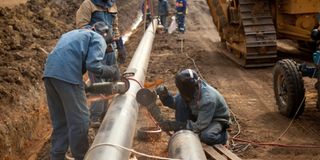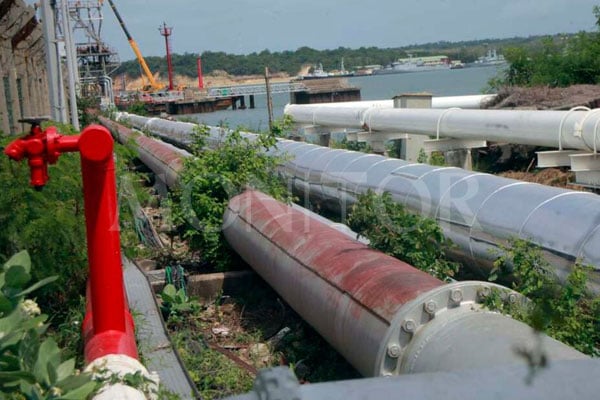We shall announce pipeline financiers next month - UNOC

A number of people both within and outside Uganda have challenged the East African Crude Oil Pipeline, claiming that it will damage the environment. PHOTO | FILE
What you need to know:
- Peter Muliisa is the Uganda National Oil Company (UNOC) chief legal and corporate affairs officer. He spoke to Julius Barigaba on a variety of issues in the oil and gas sector including the on status and viability of the East African Crude Oil Pipeline (EACOP).
What is the fate of EACOP considering the current financing, environmental and legal pressures?
We have had environmental and climate activists start a hashtag and movement to mobilise people to stop EACOP.
The thrust of their argument is that it is dangerous to the environment, it is going to displace people and wildlife and that it is going to cause major emissions, which would worsen climate change.
We do a Resettlement Action Plan, which looks at the impact of the projects on the people, and comes up with mitigation measures, based on International Finance Corporation standards, accepted by all banks in the world.
The land that EACOP needs is a 30-metre corridor. So, in most places you are not taking people’s whole land but a piece.
After construction, the pipeline is buried all the way. When it’s laid and everything is done, the land will be restored.
Why was there a delay in the first place?
It was largely because we had not taken a Final Investment Decision. But we had done everything else - we had prepared the Project Affected Persons, done the valuations, and in addition to the normal values, we have added the disturbance allowance. Now we are at the end of the resettlement action plan. It’s a long process.
The project has also been accused of damage to the environment. We know the project has an environmental issue, so we did an environmental and social impact assessment.
An oil spill could happen anytime on a pipeline. How do you mitigate this?
The pipeline is double layered steel. It has insulations that enable us to monitor what is happening at any point, from the control centres. And for every river crossing, we have put a valve on both sides of the river.
We have put in place an oil spill contingency plan, which is a requirement by law, and which is best practice. It lays out steps we would take to ensure that there is very quick efficient action.
EACOP will produce emissions. Could that derail Paris Agreement targets?
We have done as much as possible to make it a net-zero emitter project. That basically means you look at the carbon it is going to emit and you offset it by creating scenarios that will reduce carbon emission to the amount that you might emit.
Is the call to ditch fossil fuels too early, especially for Uganda?
Fossil fuels are not going to be eliminated; it is about how we use them, and the alternatives we create so that we have a balanced ecosystem so that you emit enough, not to be in danger of climate change effects.
Critics say that by pushing this project, Uganda will miss the transition to green energy. Are we thinking about that transition?
Up to 68 percent of people in sub-Saharan Africa have no access to electricity. That’s the energy poverty we are dealing with.
You are not transiting them from anything; they are at zero. I have read credible reports that say we are not likely to meet the Paris targets by 2050.
Does that mean we will not “develop in a responsible manner”?
Upstream operations contribute 10 percent emissions, but within upstream there are certain elements such as methane leakage.
One element that contributes a lot of emissions is flaring. As a country we made it a criminal act to flare in Uganda.
Are the activists unfairly targeting Uganda?
There is a need for reducing emissions to achieve the Paris targets by all countries.
What we would want to see from activists is not to target a project that is neutral, that is aimed at getting people out of energy poverty.
Why have you struggled with financing for EACOP?
We are confident with financing. Project finance is a standard process.
You reach out to financing entities and do market sounding as the project starts. When the project matures, you now issue an information memorandum to all these financiers.
Some will tell you we are not going to participate and others will tell you we are going to participate.
Those that say they are going to participate, you give them a term sheet, they return their response to the term sheet. When we got our returns, we were oversubscribed by 20 percent.
By July, we should be able to announce all the financing entities. We have entities from Europe, from Asia and all over the world.
Respected voices in oil and gas have repeatedly said EACOP’s financing will come from anywhere but Europe. Is that the case?
It’s a general feeling because the Organisation for Economic Co-operation and Development and I think the G7 have all come up and said we don’t want to finance fossil fuels.
But the reality is that banks will continue to finance good responsible projects, even in the fossil fuel space.
You must have seen that press statement by UK Energy Secretary, where he said fossil fuels will continue to be here with us for the coming decades. It’s the truth.
Upstream exploration efforts
We negotiated a production sharing agreement (PSA) for Kasuruban; we bid for two, but we didn’t get Omuka. We’ve negotiated a PSA with the ministry, we have agreed on the terms. It’s now before the solicitor general for approval and once he approves, we sign it and start exploration of that block.
EACOP was planned to transport crude for 25 to 30 years. If we don’t have new discoveries, we will have the risk of stranded assets in our midst.
Are you confident going into exploration that you will discover oil?
When we were developing the pipeline, these are the questions we were dealing with in the economic model.
The pipeline as it is today is based on the resources we know, otherwise you can’t be sure [of future discoveries].
And with the resources that we know, we shall be able to pay debt, get returns on equity. So it’s a profitable commercially viable project.
We have the technical capacity. We have probably some of the best trained technical people in geology, geophysics and geoscience.
What we’ve had challenges with is generally financing and risk appetite especially now because we are getting money from the Treasury.




